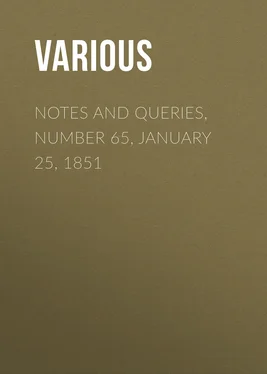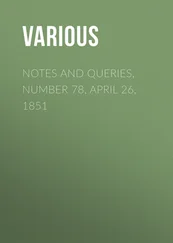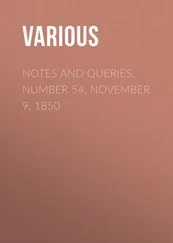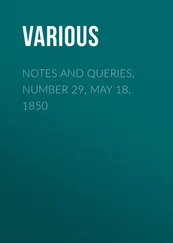Various - Notes and Queries, Number 65, January 25, 1851
Здесь есть возможность читать онлайн «Various - Notes and Queries, Number 65, January 25, 1851» — ознакомительный отрывок электронной книги совершенно бесплатно, а после прочтения отрывка купить полную версию. В некоторых случаях можно слушать аудио, скачать через торрент в формате fb2 и присутствует краткое содержание. Жанр: foreign_antique, periodic, foreign_edu, на английском языке. Описание произведения, (предисловие) а так же отзывы посетителей доступны на портале библиотеки ЛибКат.
- Название:Notes and Queries, Number 65, January 25, 1851
- Автор:
- Жанр:
- Год:неизвестен
- ISBN:нет данных
- Рейтинг книги:4 / 5. Голосов: 1
-
Избранное:Добавить в избранное
- Отзывы:
-
Ваша оценка:
- 80
- 1
- 2
- 3
- 4
- 5
Notes and Queries, Number 65, January 25, 1851: краткое содержание, описание и аннотация
Предлагаем к чтению аннотацию, описание, краткое содержание или предисловие (зависит от того, что написал сам автор книги «Notes and Queries, Number 65, January 25, 1851»). Если вы не нашли необходимую информацию о книге — напишите в комментариях, мы постараемся отыскать её.
Notes and Queries, Number 65, January 25, 1851 — читать онлайн ознакомительный отрывок
Ниже представлен текст книги, разбитый по страницам. Система сохранения места последней прочитанной страницы, позволяет с удобством читать онлайн бесплатно книгу «Notes and Queries, Number 65, January 25, 1851», без необходимости каждый раз заново искать на чём Вы остановились. Поставьте закладку, и сможете в любой момент перейти на страницу, на которой закончили чтение.
Интервал:
Закладка:
Various
Notes and Queries, Number 65, January 25, 1851
NOTES
TRADITIONAL ENGLISH BALLADS
The task of gathering old traditionary song is surely a pleasant and a lightsome one. Albeit the harvest has been plentiful and the gleaners many, still a stray sheaf may occasionally be found worth the having. But we must be careful not to "pick up a straw."
One of your corespondents recommends, as an addition to the value of your pages, the careful getting together of those numerous traditional ballads that are still sometimes to be met with, floating about various parts of the country. This advice is by no means to be disregarded, but I wish to point out the necessity of the contributors to the undertaking knowing something about ballad literature. An acquaintance with the ordinary published collections, at least, cannot be dispensed with. Without this knowledge we should be only multiplying copies of worthless trifles, or reprinting ballads that had already appeared in print.
The traditional copies of old black-letter ballads are, in almost all cases (as may easily be seen by comparison), much the worse for wear. As a proof of this I refer the curious in these matters to a volume of Traditional Versions of Old Ballads , collected by Mr. Peter Buchan, and edited by Mr. Dixon for the Percy Society. The Rev. Mr. Dyce pronounces this "a volume of forgeries ;" but, acquitting poor Buchan (of whom more anon) of any intention to deceive, it is, to say the least of it, a volume of rubbish ; inasmuch as the ballads are all worthless modern versions of what had appeared "centuries ago" in their genuine shape. Had these ballads not existed in print , we should have been glad of them in any form; but, in the present case, the publication of such a book (more especially by a learned society) is a positive nuisance.
Another work which I cannot refrain from noticing, called by one of the reviewers "A valuable contribution to our stock of ballad literature"? is Mr. Frederick Sheldon's Minstrelsy of the English Border . The preface to this volume promises much, as may be seen by the following passage:—
"It is now upwards of forty years since Sir Walter Scott published his Border Minstrelsy , and during his 'raids,' as he facetiously termed his excursions of discovery in Liddesdale, Teviotdale, Tyndale, and the Merse, very few ballads of any note or originality could possibly escape his enthusiastic inquiry; for, to his love of ballad literature, he added the patience and research of a genuine antiquary. Yet, no doubt many ballads did escape, and still remain scattered up and down the country side, existing probably in the recollection of many a sun-browned shepherd, or the weather-beaten brains of ancient hinds, or 'eldern' women: or in the well-thumbed and nearly illegible leaves of some old book or pamphlet of songs, snugly resting on the 'pot-head,' or sharing their rest with the 'Great Ha' Bible,' Scott's Worthies , or Blind Harry's lines. The parish dominie or pastor of some obscure village, amid the many nooks and corners of the Borders, possesses, no doubt, treasures in the ballad-ware that would have gladdened the heart of a Ritson, a Percy, or a Surtees; in the libraries, too, of many an ancient descendant of a Border family, some black-lettered volume of ballads, doubtlessly slumbers in hallowed and unbroken dust."
This reads invitingly; the writer then proceeds:—
"From such sources I have obtained may of the ballads in the present collection. Those to which I have stood godfather, and so baptized and remodelled, I have mostly met with in the 'broad-side' ballads, as they are called."
Although the writer here speaks of Ritson and Percy as if he were acquainted with their works, it is very evident that he had not looked into their contents. The name of Evans' Collection had probably never reached him. Alas! we look in vain for the tantalising "pamphlet of songs,"—still, perhaps, snugly resting on the "pot-head," where our author in his "poetical dream" first saw it. The "black-lettered volume of ballads" too, in the library of the "ancient descendant of a Border family," still remains in its dusty repository, untouched by the hand of Frederick Sheldon.
In support of the object of this paper I shall now point out "a few" of the errors of The Minstrelsy of the English Border .
P. 201. The Fair Flower of Northumberland :—
"It was a knight in Scotland born,
Follow my love, come over the Strand;
Was taken prisoner, and left forlorn
Even by the good Erle Northumberland."
This is a corrupt version of Thomas Deloney's celebrated ballad of "The Ungrateful Knight," printed in the History of Jack of Newbery , 1596, and in Ritson's Ancient Songs , 1790. A Scottish version may be found in Kinloch's Ballads , under the title of the "The Provost's Daughter." Mr. Sheldon knows nothing of this, but says,—
"This ballad has been known about the English Border for many years, and I can remember a version of it being sung by my grandmother!"
He also informs us that he has added the last verse but one, in order to make the "ends of justice" more complete!
P. 232. The Laird of Roslin's Daughter :—
"The Laird of Roslin's daughter
Walk'd through the wood her lane;
And by her came Captain Wedderburn,
A servant to the Queen."
This is a wretched version (about half the original length) of a well-known ballad, entitled "Captain Wedderburn's Courtship." It first appeared in print in The New British Songster , a collection published at Falkirk, in 1785. It was afterwards inserted in Jamieson's Popular Ballads and Songs , 1806; Kinloch's Ancient Ballads , 1826; Chambers' Scottish Ballads , 1829, &c. But hear what Mr. Sheldon has to say, in 1847:—
"This is a fragment of an apparently ancient ballad, related to me by a lady of Berwick-on-Tweed, who used to sing it in her childhood. I have given all that she was able to furnish me with. The same lady assures me that she never remembers having seen it in print [!!], and that she had learnt if from her nurse, together with the ballad of 'Sir Patrick Spens,' and several Irish legends, since forgotten."
P. 274. The Merchant's Garland :—
"Syr Carnegie's gane owre the sea,
And's plowing thro' the main,
And now must make a lang voyage,
The red gold for to gain."
This is evidently one of those ballads which calls Mr. Sheldon "godfather." The original ballad, which has been "baptized and remodelled," is called "The Factor's Garland." It begins in the following homely manner:—
"Behold here's a ditty, 'tis true and no jest
Concerning a young gentleman in the East,
Who by his great gaming came to poverty,
And afterwards went many voyages to sea."
P. 329. The rare Ballad of Johnnie Faa :—
"There were seven gipsies in a gang,
They were both brisk and bonny O;
They rode till they came to the Earl of Castle's house,
And here they sang so sweetly O."
This is a very hobbling version (from the recitation of a "gipsy vagabond") of a ballad frequently reprinted. It first appeared in Ramsay's Tea-Table Miscellany ; afterwards in Finlay's and Chambers' Collections. None of these versions were known to Mr. Sheldon.
I have now extracted enough from the Minstrelsy of the English Border to show the mode of "ballad editing" as pursued by Mr. Sheldon. The instances are sufficient to strengthen my position.
Читать дальшеИнтервал:
Закладка:
Похожие книги на «Notes and Queries, Number 65, January 25, 1851»
Представляем Вашему вниманию похожие книги на «Notes and Queries, Number 65, January 25, 1851» списком для выбора. Мы отобрали схожую по названию и смыслу литературу в надежде предоставить читателям больше вариантов отыскать новые, интересные, ещё непрочитанные произведения.
Обсуждение, отзывы о книге «Notes and Queries, Number 65, January 25, 1851» и просто собственные мнения читателей. Оставьте ваши комментарии, напишите, что Вы думаете о произведении, его смысле или главных героях. Укажите что конкретно понравилось, а что нет, и почему Вы так считаете.












